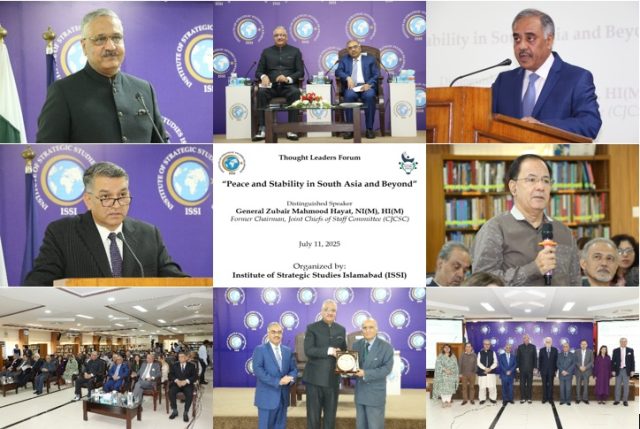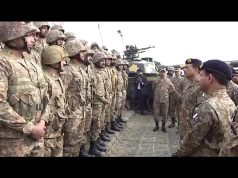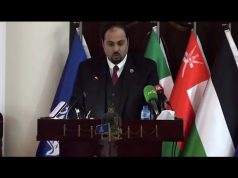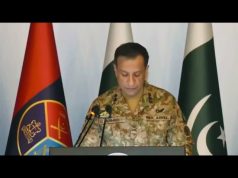ISLAMABAD, Friday, July 11, 2025 (WNP): Former Chairman Joint Chiefs of Staff Committee (CJCSC), General (R) Zubair Mahmood Hayat on Friday cautioned that South Asia remains perilously close to instability, trapped in a “complex security quagmire” exacerbated by the absence of effective crisis management mechanisms, lack of regional security architecture, and diminishing avenues for dialogue.
Delivering the keynote address on the theme “Peace and Stability in South Asia and Beyond.” at the Institute of Strategic Studies Islamabad (ISSI), in the latest edition of its Thought Leaders Forum (TLF), he warned that the doomsday clock for South Asia stands at 30 seconds to midnight, pointing to India’s shifting ideological and strategic posture, its military buildup, and a drift from the ‘Doval Doctrine’ to the more aggressive ‘Modi Doctrine’ as deeply destabilizing developments.
General Hayat questioned prevailing assumptions about peace, asserting that true peace “cannot be imposed, bought, or externally driven—it must be earned through justice, trust, and sovereign equality.” He highlighted how the 2025 crisis has added water security to the already volatile Kashmir dispute, reinforcing South Asia’s status as a potential flashpoint.
He urged Pakistan to seize this critical moment for internal revitalization, strengthen national cohesion, and proactively position itself in a changing global landscape.
In his welcome remarks, Ambassador Sohail Mahmood, Director General ISSI, underscored the rapidly evolving global order, characterized by great power rivalry, increasing militarization, erosion of multilateralism, and the emergence of non-traditional threats. Referring to the recent crisis in South Asia, he highlighted India’s unfounded accusations against Pakistan following a terrorist incident in Indian Illegally Occupied Jammu & Kashmir (IIOJK), which nearly escalated into a full-scale conflict in May 2025.
He noted that Pakistan responded to Indian aggression with a measured and resolute approach, maintaining both strategic firmness and diplomatic maturity. Ambassador Sohail stressed the urgent need for structured crisis communication, ceasefire stabilization, and final dispute resolution, especially in light of the fragile regional environment marked by a stalled SAARC process, heightened securitization, and long-standing disputes such as Kashmir.
He emphasized that Pakistan must maintain a strong defence posture while pursuing proactive diplomacy to navigate the complex strategic terrain and contribute to long-term regional peace.
Earlier, in his introductory remarks, Dr. Talat Shabbir, Director of the China-Pakistan Study Centre at ISSI, outlined the strategic relevance of peace and stability in South Asia amid mounting traditional and non-traditional security threats.
The session concluded with a dynamic question-and-answer segment, allowing participants to engage directly with General Hayat’s thought-provoking analysis.
Ambassador Khalid Mahmood, Chairman of ISSI’s Board of Governors, presented a memento to the distinguished guest, marking the end of a compelling forum aimed at fostering deeper understanding of South Asia’s security challenges and the pursuit of enduring peace.
The session brought together scholars, diplomats, and policy experts to reflect on the shifting regional security landscape, rising tensions, and strategic imperatives for sustainable peace.




